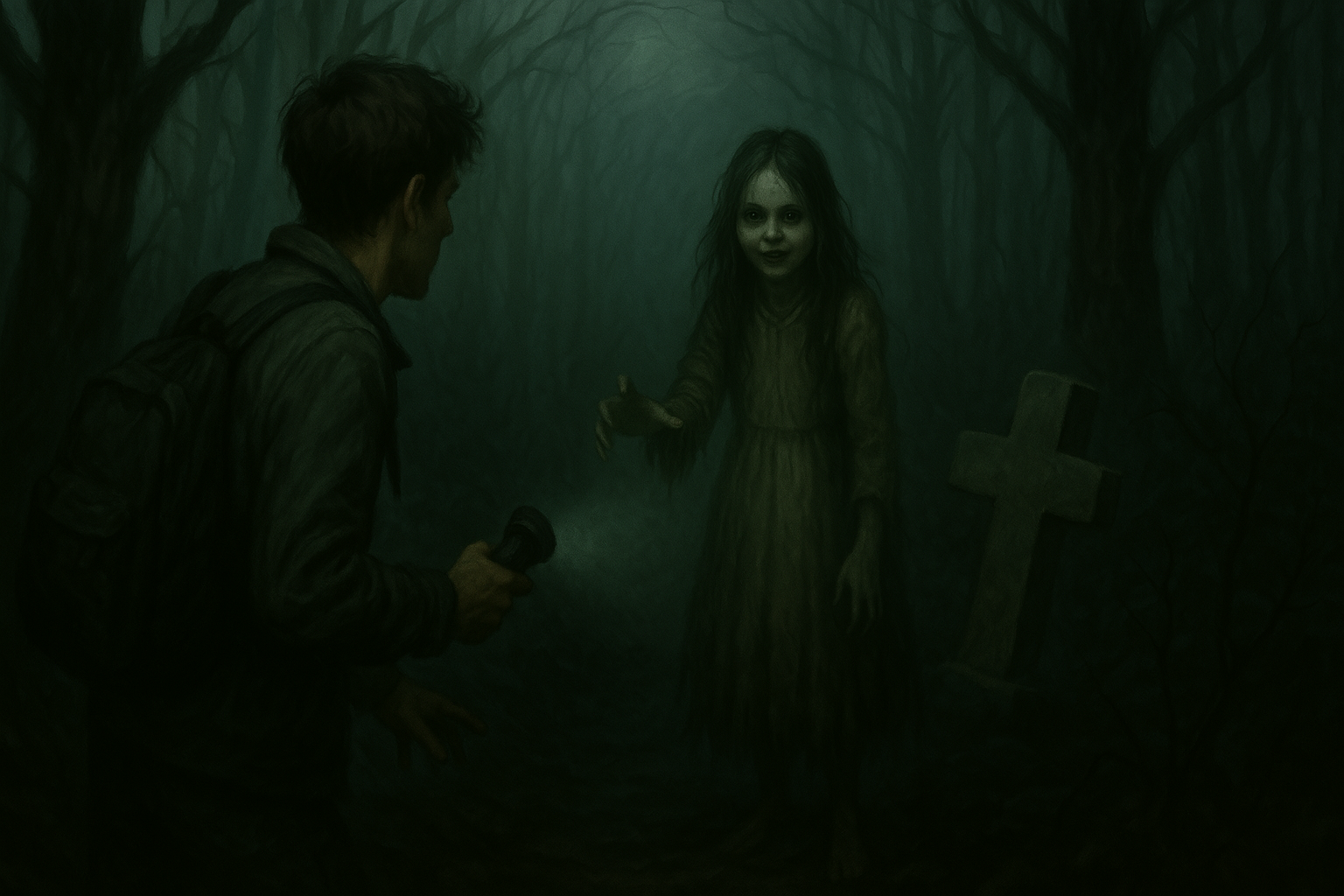
Based on The Legend of Maud’s Grave
Hell Hollow was a place that the locals never went after sundown. Some claimed it was superstition, others a fear engrained in them because of generations of whispered warnings. But now and then, someone would be foolish enough to try — the daring, the adventurous and those foolish enough to think the stories were nothing but stories, told to scare children.
James Whitaker didn’t believe in ghost stories.
He had spent his childhood in Voluntown, nurtured on tales of witches and woodland spirits. His grandmother warned him about the hollow, and why he must not go in after dark. He laughed at her tales, and said her stories were old wives’s tales of a woman over-laden with the past.
But now, as he stood at the edge of Pachaug State Forest, flashlight in hand, and for a moment he hesitated.
The trees were unnaturally swaying even though there was no wind. The dark interior surrounded him like an invisible force. It was supposed to be just another Friday night escapade. Friends had dared him to visit Maud’s Grave —to stand on it, to speak her name and prove the legend a lie.
He tightened a strap on his backpack and pressed forward.
And the forest swallowed him as he stepped inside.
James made his way along a barely visible path, his breath steady, but cautious. The Reynolds’ old family cemetery had a marked entrance; however, Maud’s grave was not there.
“They say it was placed near her house,” James muttered to himself. “So her parents would be able to see it all the time.
He had read the stories. “Maud Reynolds, dead in 1890. A witch, a curse, a tragic fate.” The details changed slightly with every retelling, making it all but impossible to tell truth from horrific.
Then he saw it — a crumbling stone cross, tilted to one side, almost lost in the forest floor. Maud’s grave, his breath stopped his breath in his throat.
He moved nearer, the lettering caught by the flashlight: “MAUD REYNOLDS, OCTOBER 1890”.
A cold chill ran down his spine. He recalled the words grandmother shared “don’t speak her name after dark. Don’t stand too close to her grave”.
James ignored the memory.
“Maud Reynolds,” he murmured.
The wind howled.
His flashlight flickered.
And then a sound — not leaves rustling, not the call of an animal.
A voice.
James whipped around, assuming that one of his friends was playing a prank.
Nobody was there.
The trees stretched for miles, their shadows leaning unnaturally in the dim glow of the pale moon. The voice was faint, garbled, not unlike a child choking for breath.
James’s took a step back, and Unease crept into his bones.
Then he heard it again.
A raspy inhale. A whisper, barely audible.
A giggling breath.
His pulse quickened.
The stories had cautioned against this. Some say Maud died choking on an apple. Her dying breath was a struggling, desperate gasp.
James turned to run.
But the forest wouldn’t allow him.
The path had disappeared.
His flashlight flickered, the darkness pressed closer.
Then, he saw her.
A small little figure that stood just beyond the cross. Barefoot, ragged dress, moonlit dark eyes.
It was Maud.
James stumbled backward.
The figure didn’t move. It was hard to her expression was hard to read; it was a mix of sorrow and curiosity. His hurrying steps crushed fallen leaves on the ground.
Then she spoke.
“You came to find me.”
James shuddered.
Her voice was not quite right — it stretched unnaturally, like a thousand whispers layered one on top of another.
“I — I didn’t mean to disturb you,” He stammered, his breathing still uneven.
She blinked slowly, like she was thinking about he’d said.
Then she reached out.
Her fingers bent, clawing at the air as if trying to catch something invisible.
The legend had warned of this too— “those who stand on Maud’s grave feel an icy hand, pull them down”.
James jumped back.
Her figure blurred. The trees moved unnaturally – branches bent inwards.
Then he heard a scream.
A piercing, echoing cry.
James didn’t stick around.
He ran.
The branches’ scratched at his arm as he dashed through the trees. The atmosphere was heavy, every breath harder than the one before.
The scream followed him, sounding like it was getting closer.
Then—silence.
James stumbled and fell down.
The wind stilled.
He was gasping for air, his chest rising and falling as he wheezed.
He turned back to the grave, reluctantly.
Maud was gone.
The trees stood still.
The cross was still cold and hard.
James gave a sharp exhale, and pressed his hands into the moist soil.
Had he imagined it? Had the stories play tricks on him?
His phone buzzed. A message from a friend:
“Where are you? You’ve been gone for hours.”
His body ached as if he’d been running for miles.
Trembling, he rose to his feet.
He didn’t look back.
James never spoke about that night, not to his friends, not to his grandmother.
But he never returned to Hell Hollow.
And then every so often — late at night — he’d swear he could still hear her.
The breathless whisper, the quiet giggle.
The memory of Maud’s grave never truly him.
And maybe it never would.
